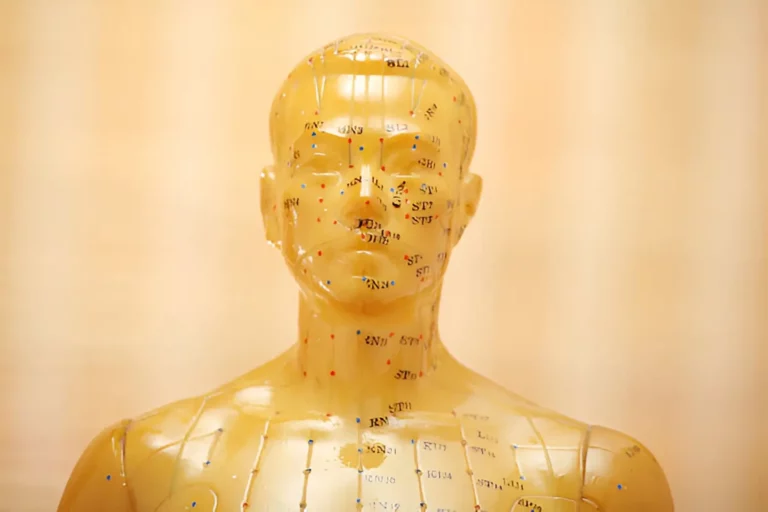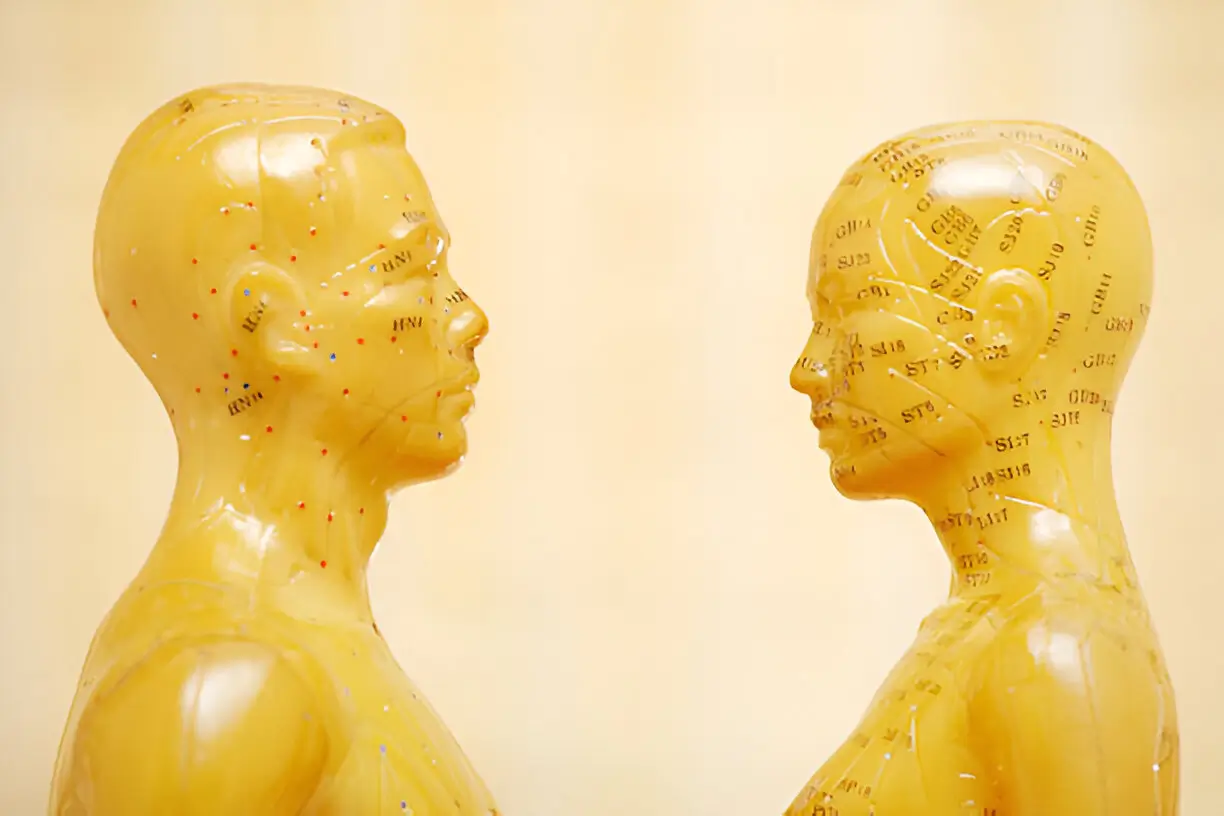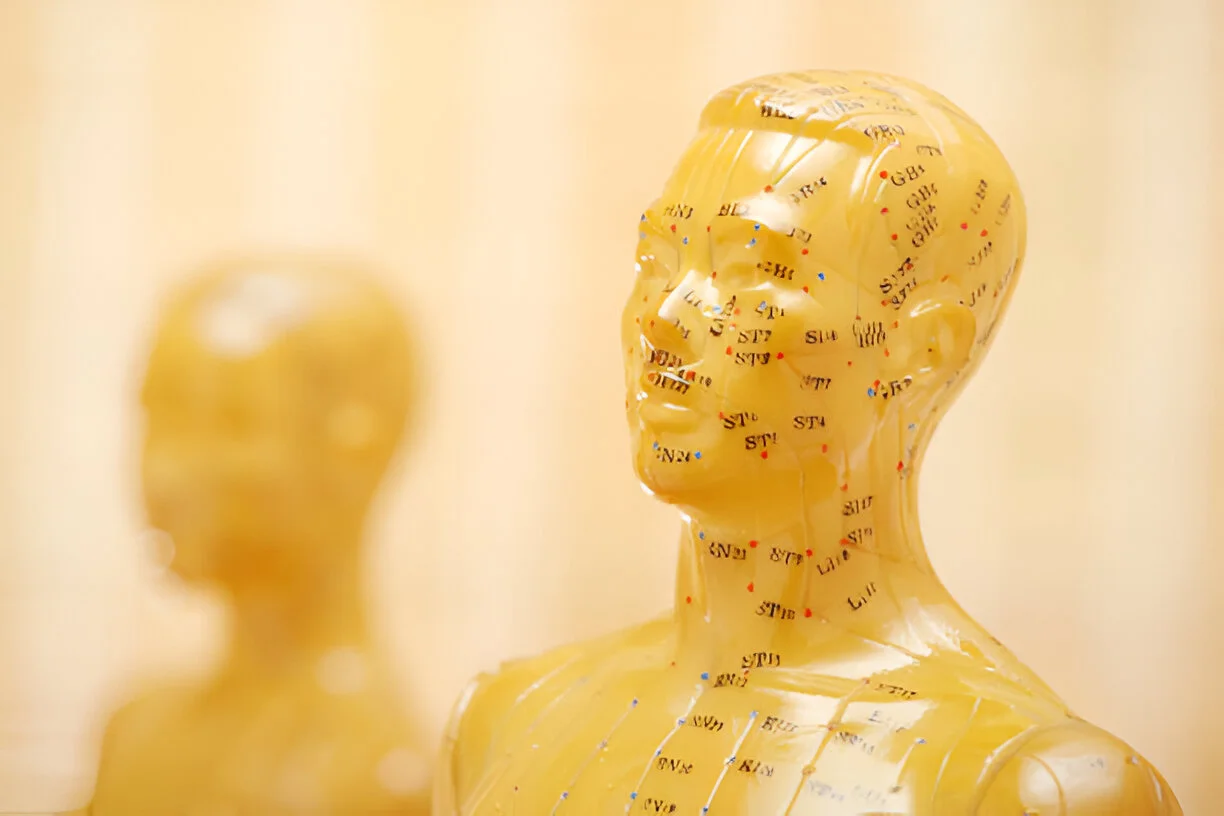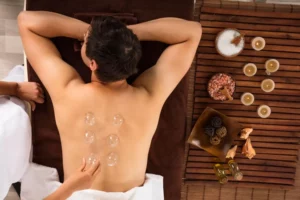For thousands of years, acupuncture has been practiced as a natural method to promote healing and sustain balance throughout the body. One of the most important parts of such a procedure are meridians. They are pathways or acupuncture channels that carry energy, known as Qi (pronounced “chee”), throughout the body. Meridians influence various aspects of physical and emotional health. Acupuncture practitioners understand and work with these meridians, fixing imbalances in the body. We will guide you through the basics of acupuncture meridians, like their function and importance.
What is an Acupuncture Meridian?
Meridians of the body are invisible channels that circulate energy and blood. This is the base of traditional Chinese medicine (TCM) and acupuncture. According to TCM, when the flow of Qi through these meridians is disrupted, it can lead to pain, illness, or emotional imbalances.
Acupuncture can restore the proper flow of Qi. It stimulates specific points along these meridians. These points are used to treat various conditions, like chronic pain, stress and anxiety, depression, flu and so on. Think of meridians like it’s a network the purpose of which is to connect different parts of the body. The goal of meridians is to allow communication and energy exchange. This system is unique because it combines physical, emotional, and spiritual aspects of health.
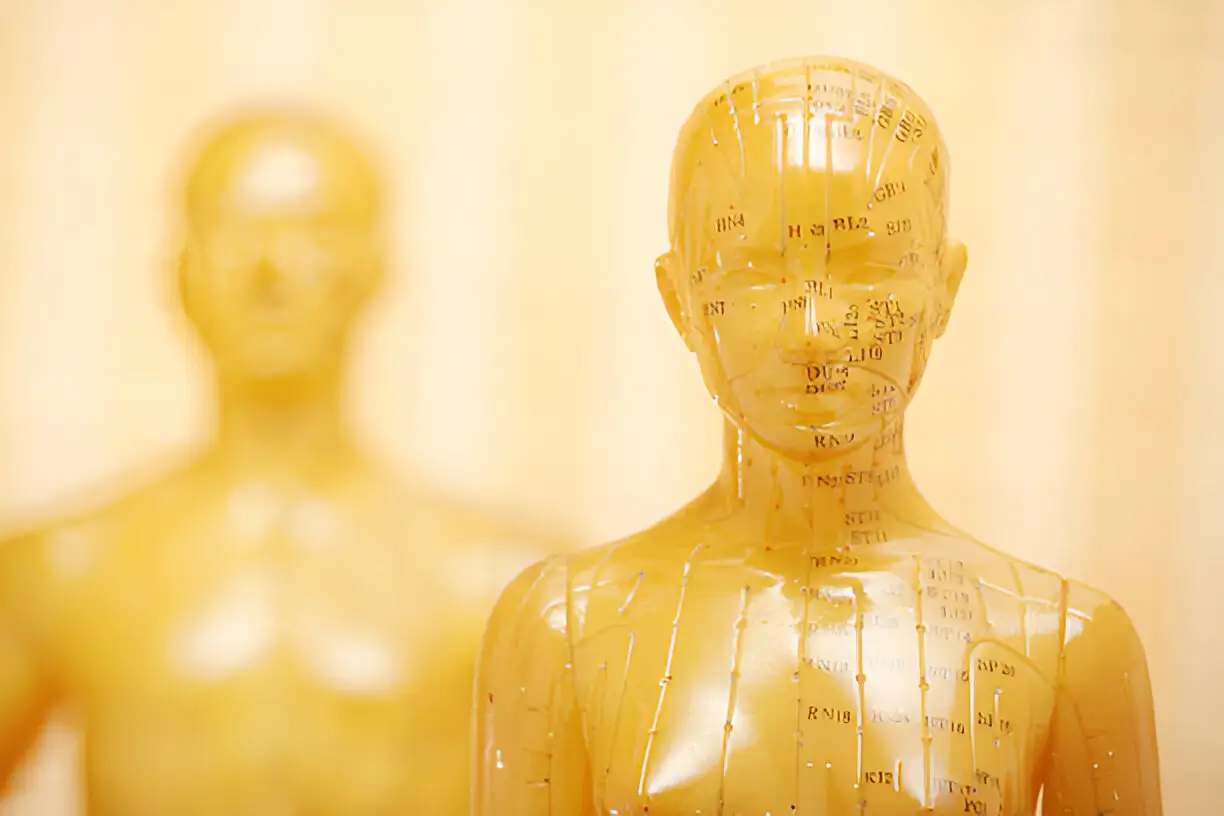
The Acupuncture Meridian System
The acupuncture meridian point system is a complex network of pathways that connects different parts of the body. It is divided into 12 main meridians, each associated with a specific organ or function. These meridians are paired, with one on each side of the body, and they are connected in such a way that they form a continuous loop. The system also includes two additional meridians, known as the Governing Vessel and the Conception Vessel.
Key features of the acupuncture meridian system include:
- 12 Main Meridians. Each linked to specific organs or functions.
- Paired Structure. Meridians are mirrored on both sides of the body.
- Continuous Energy Loop. Ensures a smooth flow of energy (Qi) throughout the body.
- Governing and Conception Vessels. Regulate Yin and Yang energy.
12 Meridians of Acupuncture
The 12 meridians of acupuncture are linked to organs and emotions chart also the functions within the body. Each meridian has its own set of acupuncture points that can be used to treat different conditions. Let’s discuss these meridians in more detail.
Heart Meridian (HT)
The Heart Meridian is responsible for regulating the flow of blood and energy throughout the body. It is also associated with emotional well-being, particularly in terms of joy and happiness. When the Heart Meridian is balanced, a person may feel calm and content. However, when this meridian is disrupted, it can lead to issues such as anxiety, insomnia, and palpitations. An acupuncturist can treat a variety of conditions, including emotional disturbances and heart-related issues.
Lung Meridian (LU)
The Lung Meridian regulates the body’s respiratory functions. It is also associated with the immune system and the body’s ability to protect itself from external pathogens. When the Lung Meridian is balanced, you’ll have strong lungs and an immune system. However, when this meridian is out of balance, it can lead to respiratory issues, such as asthma, bronchitis, or colds. Acupuncture points along the Lung Meridian can be used to boost the immune system, improve breathing, and treat conditions such as allergies and asthma.
Stomach Meridian (ST)
The Stomach Meridian can help with digestion and the absorption of nutrients. It is also associated with the process of nourishing the body and mind. When the Stomach Meridian is balanced, digestion functions smoothly, and a person feels energized and nourished. However, when this meridian is out of balance, it can lead to digestive issues such as bloating, indigestion, and nausea. Acupuncture points along the Stomach Meridian can be used to address a wide range of digestive disorders, from acid reflux to constipation. This meridian is also connected to mental clarity and focus, making it an important aspect of both physical and mental health.
Kidney Meridian (KI)
The Kidney Meridian is the root of life in traditional Chinese medicine. These acupuncture connections are associated with growth, development, reproduction, and aging. The kidneys store the body’s vital essence, known as Jing, important for overall vitality and longevity. When the Kidney Meridian is balanced, a person will have strong bones, healthy hair, and a good memory. However, when this meridian is out of balance, it can lead to issues such as low energy, infertility, and premature aging. Acupuncture points along the Kidney Meridian can be used to strengthen the kidneys, support reproductive health, and improve energy levels.
Large Intestine Meridian (LI)
The Large Intestine Meridian needs to eliminate waste and toxins from the body. It is also associated with the ability to let go of negative emotions and experiences. When the Large Intestine Meridian is balanced, a person will have regular bowel movements and emotional clarity. However, when this meridian is out of balance, you’ll have constipation, diarrhea, and emotional blockages. Acupuncture points along the Large Intestine Meridian can be used to promote healthy digestion, relieve constipation, and support emotional well-being.
Small Intestine Meridian (SI)
The Small Intestine Meridian separates the pure from the impure, physically and emotionally. It is responsible for absorbing nutrients from food and filtering out what the body does not need. When the Small Intestine Meridian is balanced, a person will have clear thinking, good digestion, and acquire a sense of purpose. However, when this meridian is out of balance, it can lead to digestive issues, confusion, and emotional overwhelm. Acupuncture points along the Small Intestine Meridian can be used to improve digestion, enhance mental clarity, and support emotional balance.
Liver Meridian (LV)
The Liver Meridian is associated with the smooth flow of Qi throughout the body. It plays a key role in regulating emotions, particularly anger and frustration. When the Liver Meridian is balanced, a person may feel emotionally stable and free from stress. However, when this meridian is out of balance, it can lead to issues such as irritability, headaches, and menstrual irregularities. Acupuncture points along the Liver Meridian can be used to promote emotional balance, relieve stress, and support menstrual health.
Bladder Meridian (BL)
The Bladder Meridian is the longest meridian in the body, running from the head to the toes. It is associated with the storage and elimination of urine, as well as the body’s ability to release tension. When the Bladder Meridian is balanced, you’ll have regular urination and feel relaxed. But when this meridian is out of balance, it can lead to issues such as urinary problems, back pain, and stress. Acupuncture points along the Bladder Meridian can be used to promote healthy bladder function, relieve back pain, and reduce stress.
Gallbladder Meridian (GB)
The Gallbladder Meridian is associated with decision-making and courage. It is responsible for storing and excreting bile, which is important for digestion. When the Gallbladder Meridian is balanced, a person may feel confident and decisive. However, when this meridian is out of balance, it can lead to issues such as indecision, digestive problems, and headaches. Acupuncture points along the Gallbladder Meridian can be used to support healthy digestion, promote clear thinking, and improve decision-making abilities.
Spleen Meridian (SP)
The Spleen Meridian is associated with the body’s ability to transform and transport nutrients. It is also linked to the production of blood and the maintenance of energy levels. When the Spleen Meridian is balanced, a person may feel strong, energized, and mentally clear. However, when this meridian is out of balance, it can lead to issues such as fatigue, poor digestion, and worry. Acupuncture points along the Spleen Meridian can be used to boost energy levels, improve digestion, and support mental clarity.
Pericardium Meridian (PC)
The Pericardium Meridian is associated with the protective layer around the heart. It is responsible for emotional well-being and is often linked to feelings of love and compassion. When the Pericardium Meridian is balanced, a person may feel emotionally secure and connected to others. When this meridian is out of balance, it can lead to issues such as anxiety, emotional instability, and heart-related problems. Acupuncture points along the Pericardium Meridian can be used to support emotional health, relieve anxiety, and promote heart health.
Triple Burner Meridian (TB)
The Triple Burner Meridian is unique in that it is not associated with a specific organ but rather with the regulation of the body’s temperature and fluid balance. It is divided into three sections: the upper, middle, and lower burners, each corresponding to different functions within the body. When the Triple Burner Meridian is balanced, a person may experience optimal body temperature and fluid balance. If this meridian is out of balance, it can lead to issues such as fluid retention, digestive problems, and temperature regulation issues.
Two Extra Body Meridians
In addition to the 12 main meridians, there are two extra body meridians: the Governing Vessel (GV) and the Conception Vessel (CV). These meridians are considered “extra” because they are not associated with specific organs but rather with the overall regulation of the body’s energy. The Governing Vessel runs along the spine and is responsible for the flow of Yang energy, while the Conception Vessel runs along the front of the body and is responsible for the flow of Yin energy.
Governing Vessel (GV)
The Governing Vessel is also known as the “Sea of Yang” and is responsible for regulating the flow of Yang energy in the body. It runs along the spine, starting at the base of the spine and ending at the top of the head. This meridian is associated with the nervous system, and it maintains the body’s posture, balance, and coordination. When the Governing Vessel is balanced, a person may experience strong bones, good posture, and a calm mind. If this meridian is out of balance, it can lead to issues such as back pain, headaches, and nervous tension. Meridian acupuncture points along the Governing Vessel can be used to ease pain, support nervous system health, and promote overall well-being.
Conception Vessel (CV)
The Conception Vessel is also known as the “Sea of Yin” and is responsible for regulating the flow of Yin energy in the body. It runs along the front of the body, starting at the perineum and ending at the lower lip. This meridian is associated with the reproductive system and plays a key role in supporting fertility, menstrual health, and overall vitality. When the Conception Vessel is balanced, a person may experience regular menstrual cycles, strong reproductive health, and emotional stability. However, when this meridian is out of balance, it can lead to issues such as menstrual irregularities, infertility, and emotional imbalances.
Conclusion: The Holistic Benefits of Understanding Acupuncture Meridians
These meridian pathways are the foundation of acupuncture and provide insight into the body’s overall health and well-being. By working with the meridians, practitioners can address a wide range of health issues, from physical pain to emotional imbalances.
If you are looking for a natural way to heal, consider trying tui na massage and acupuncture at Pulse Acupuncture. Located in Clifton, N.J., and Williamsburg, Brooklyn, Pulse Acupuncture offers fully personalized acupuncture treatments designed to address your specific needs. The clinic is led by Marina Doktorman, L.Ac., a licensed acupuncturist with years of experience in treating digestive disorders, including constipation.
By addressing the root causes of your conditions, acupuncture can help you find relief and improve overall well-being. Our skilled practitioner at Pulse Acupuncture can help you achieve better health naturally. For better results, we may also include cupping therapy into your treatment plan, but there are also other options.
Read also:
Frequently Asked Questions About Acupuncture Meridians
What are Acupuncture Meridians?
Acupuncture meridians are pathways or channels through which vital energy, known as Qi (pronounced “chee”), flows throughout the body. In Traditional Chinese Medicine (TCM), these meridians connect the body’s organs, tissues, and systems, maintaining harmony and balance. When the flow of Qi is disrupted or blocked, it can lead to pain or illness — acupuncture helps restore smooth energy flow through these meridians.
What is the Purpose of Acupuncture Meridians?
Meridians serve as communication networks that distribute Qi, blood, and other vital substances throughout the body. Their purpose is to maintain physical, emotional, and energetic balance by ensuring all organs and systems function harmoniously.
How Do Acupuncturists Use Meridians During Treatment?
Acupuncturists use fine, sterile needles to stimulate specific acupuncture points along meridian pathways. By doing so, they influence the flow of Qi, releasing blockages, tonifying deficiencies, and restoring balance. Each acupuncture point has a unique function and therapeutic effect, depending on the meridian it belongs to.
What are Some of the Main Meridians and Their Functions?
Here are a few key meridians and their primary roles:
– Lung Meridian: Governs breathing, immune function, and emotional balance.
– Liver Meridian: Regulates the flow of Qi and emotions, supports detoxification.
– Heart Meridian: Controls blood circulation and emotional health.
– Kidney Meridian: Stores vital energy (Essence), supports fertility and longevity.
– Stomach and Spleen Meridians: Aid in digestion and energy production.
– Bladder Meridian: Removes toxins and supports the nervous system.
-
Marina Doktorman, M.S., L.Ac., is an experienced acupuncturist who obtained her Masters of Acupuncture from the Tri-State College of Acupuncture in New York City in 2001. During her studies, she focused on Chinese Herbology, a branch of Traditional Chinese Medicine (TCM) that utilizes herbs to complement acupuncture treatments. Marina is licensed in both New York (NY) and New Jersey (NJ) and holds a Diplomate of Acupuncture from the National Certification Commission for Acupuncture and Oriental Medicine (NCCAOM), indicating her expertise in the field.


